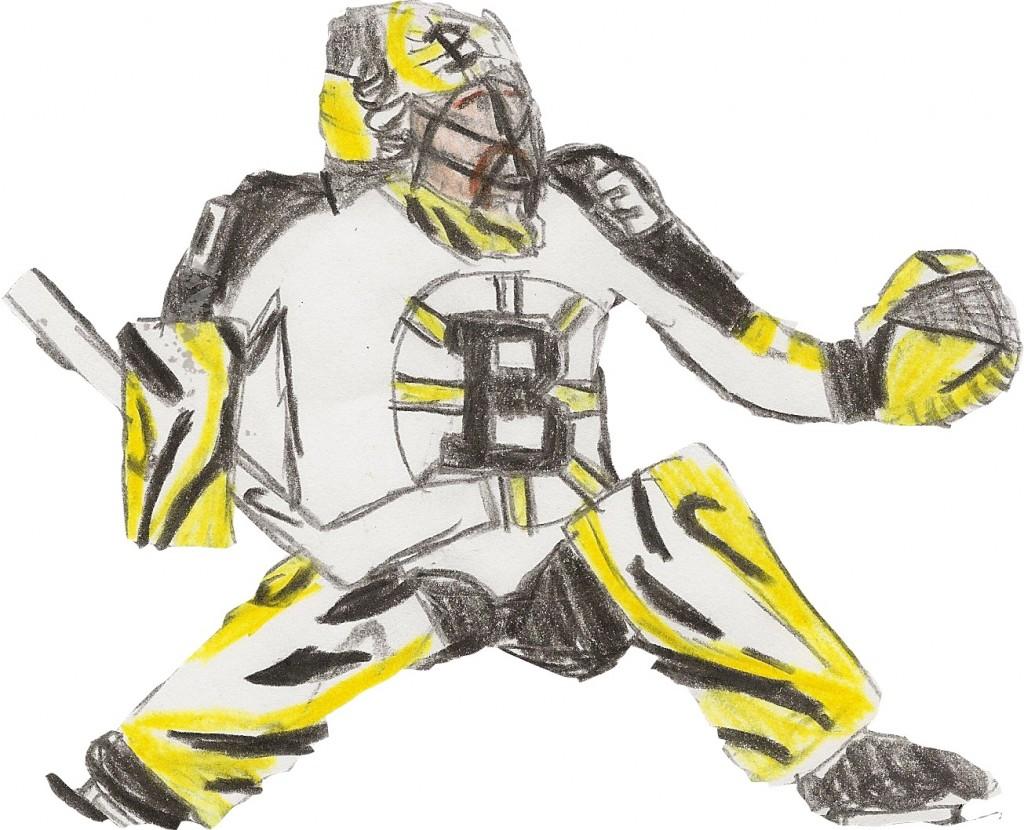When the Boston Bruins beat the Vancouver Canucks to win the Stanley Cup in 2011, the team received the traditional honor of an invitation to the White House to meet with President Barack Obama. While the majority of the players on the team, of which only two are American, took advantage of the potentially once-in-a-lifetime opportunity to hang out with the leader of the free world, one key playoff performer was notably absent.
Tim Thomas, the Bruins’ goalie and one of the two Americans, declined his White House invitation, citing his “right as a Free Citizen” on his Facebook page. Although Thomas claimed that the move was not political, and that he blames both parties for allowing the government to grow “out of control,” the goalie has advertised his conservative views on his uniform in the past. One mask that Thomas has used featured the phrase “Don’t tread on me,” which has been adopted by the Tea Party.
In light of the upcoming presidential election, it is vital to examine the role that sports can play in American politics. Modern professional athletes are celebrities, and carry significant influence, especially among their fans. With all of the sports coverage in the media, as well as the growing popularity of social media sites like Facebook and Twitter, athletes are offered a visible platform from which they can champion their political views. But does that mean that they should?
In this era of bitter partisanship, politics already cause enough divisions in this country. Sports should bring people together, from friends gathering to watch the Super Bowl to millions of angry New Yorkers collectively cursing the Red Sox. Although sports can produce intense competition between rival teams and fans, at the end of the day the team you root for seems almost trivial compared to more serious political disagreements.
Fans watch sports because they are enjoyable and fun. If anything, following your favorite team should be an escape from the real world, not a reminder of troubling divisions over political issues among Americans. Bruins fans should be worrying more about Thomas’s netminding than about whether or not they agree with his political views, but with such an inflammatory political statement, this can become nearly impossible.
Of course athletes have a right to their own personal viewpoints. They can and should form their own opinions and support the candidates they believe in. However, they should not use their athletic fame or success as a political platform in the negative way that Thomas did. When the majority of a team’s players are Canadian and European, and every single one of them is willing to visit the President of the United States, but an American teammate is not, something is wrong. It does not matter how vehemently you may disagree with his or her political beliefs. When the President invites you to the White House, as an American, you go.
There are other ways for athletes to express their political views. They can easily make donations to campaigns they support, or endorse their preferred candidates.
Not surprisingly, many athletes and others affiliated with sports do choose to go this route. Both President Obama and Mitt Romney each have several athletes and sports figures who have publicly endorsed them. Several Olympians spoke at the Republican National Convention in support of Romney, including Kim Rhode, who has won five consecutive gold medals in skeet shooting. According to his website, Romney also enjoys the support of several NFL and NBA owners, such as Stephen Ross, Robert Kraft and Woody Johnson, who own the Miami Dolphins, New England Patriots and New York Jets, respectively. President Obama has the support of a handful of current and former NBA and NFL players, including LeBron James, Carmelo Anthony, Kevin Love and Michael Jordan.
Endorsements of this type are acceptable. It is fine for athletes to make a public statement regarding which candidate they support, especially with an issue as large as the American presidential election. After all, as American citizens they have every right to support whichever candidate they’d like to, and try convince others of the validity of their opinions. However, they should keep it positive. Instead of attacking opposing candidates, as folks debating politics too often do, the athletes should discuss why they choose support the candidates they do.
In contrast to Thomas, the 2012 U.S. Olympic team visited the White House on Sept. 14 to meet President Obama. Nearly 400 (out of about 600) chose to attend the event, including big names like Michael Phelps and Paly’s own Lily Zhang (‘14). While almost 200 did not attend, many, such as the “Fierce Five” women’s gymnastics team, were on tour elsewhere or had prior engagements. While it would seem that meeting the President would take precedent over other commitments, these conflicts are understandable and bound to happen with such a large group. And even if one misguided athlete attempted to create a political spectacle out of the whole thing, it would hardly be noticeable behind the 400 or so athletes who did choose to attend.
If Thomas is truly as patriotic as he implies with the decorations on his mask, he should visit the President next time, regardless of who is in office, or at least make up a plausible excuse about another commitment. After all, the country that Thomas supports will have elected the President, and he should respect that choice. If Thomas and other athletes really hope to help their country, they should work on promoting unity rather than partisan divisions, which would include visiting the President of the United States, even if he or she may have done something they disagree with. After all, an interest in what is best for the country as a whole shows true patriotism.




